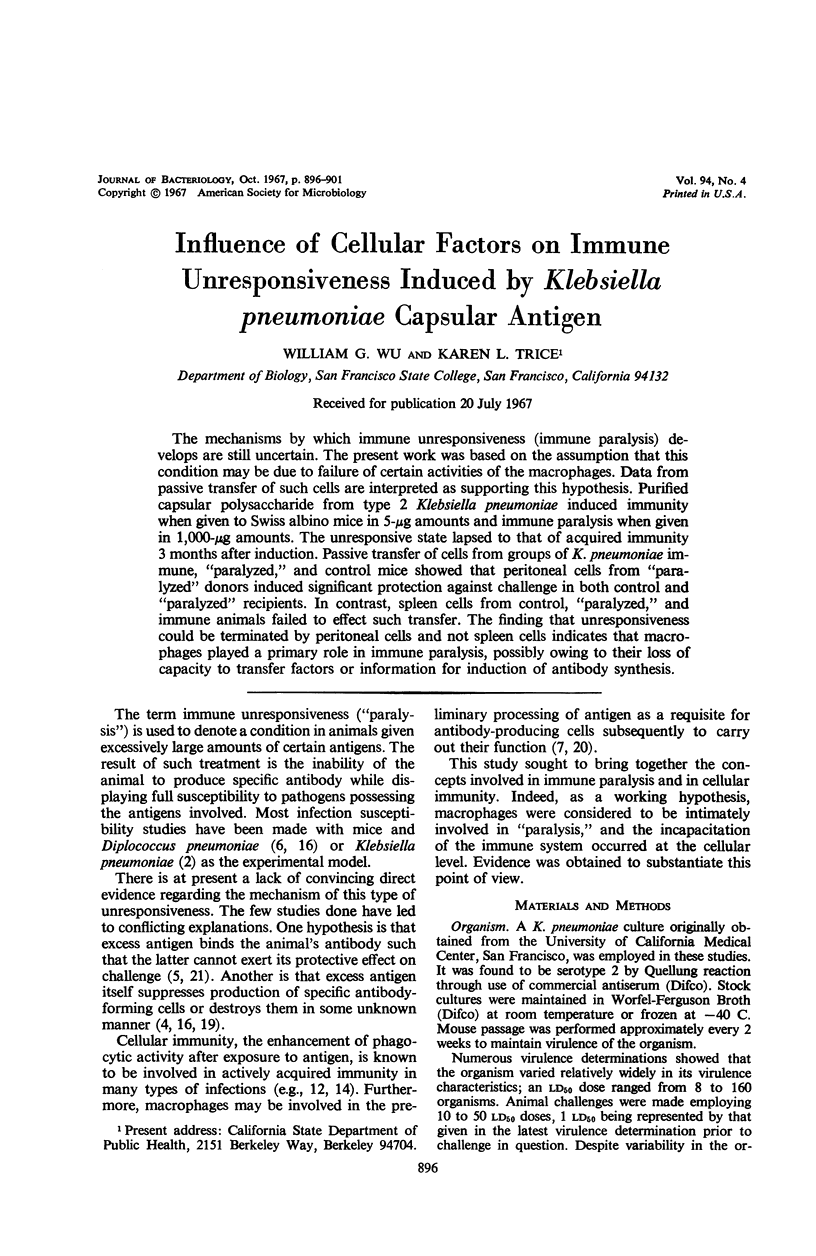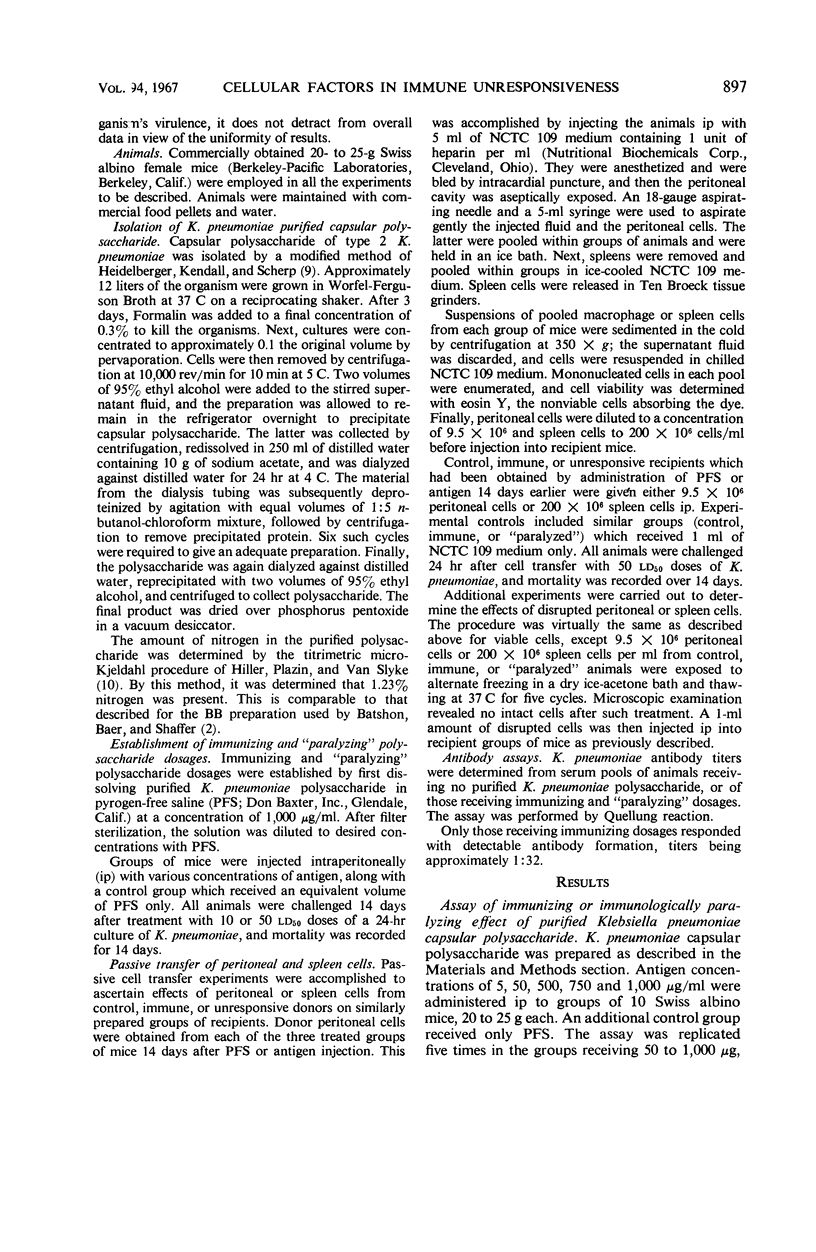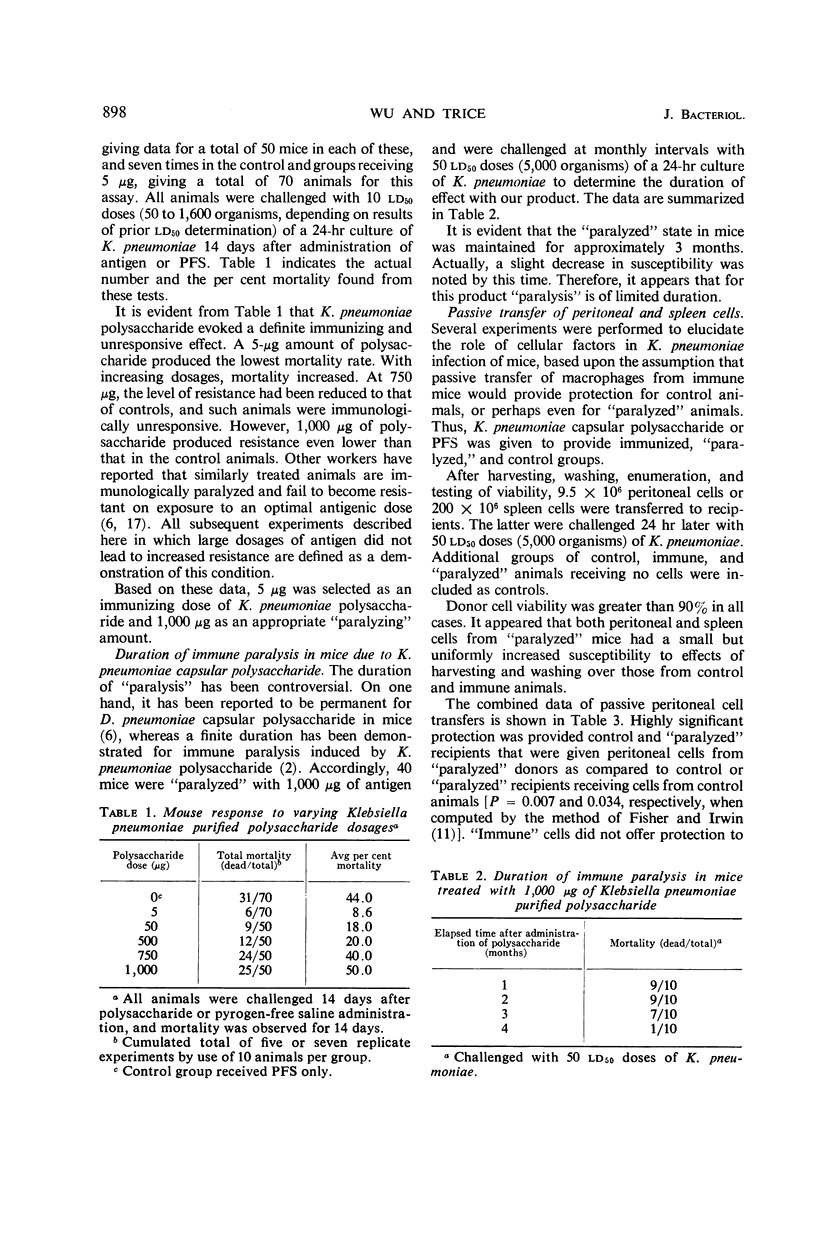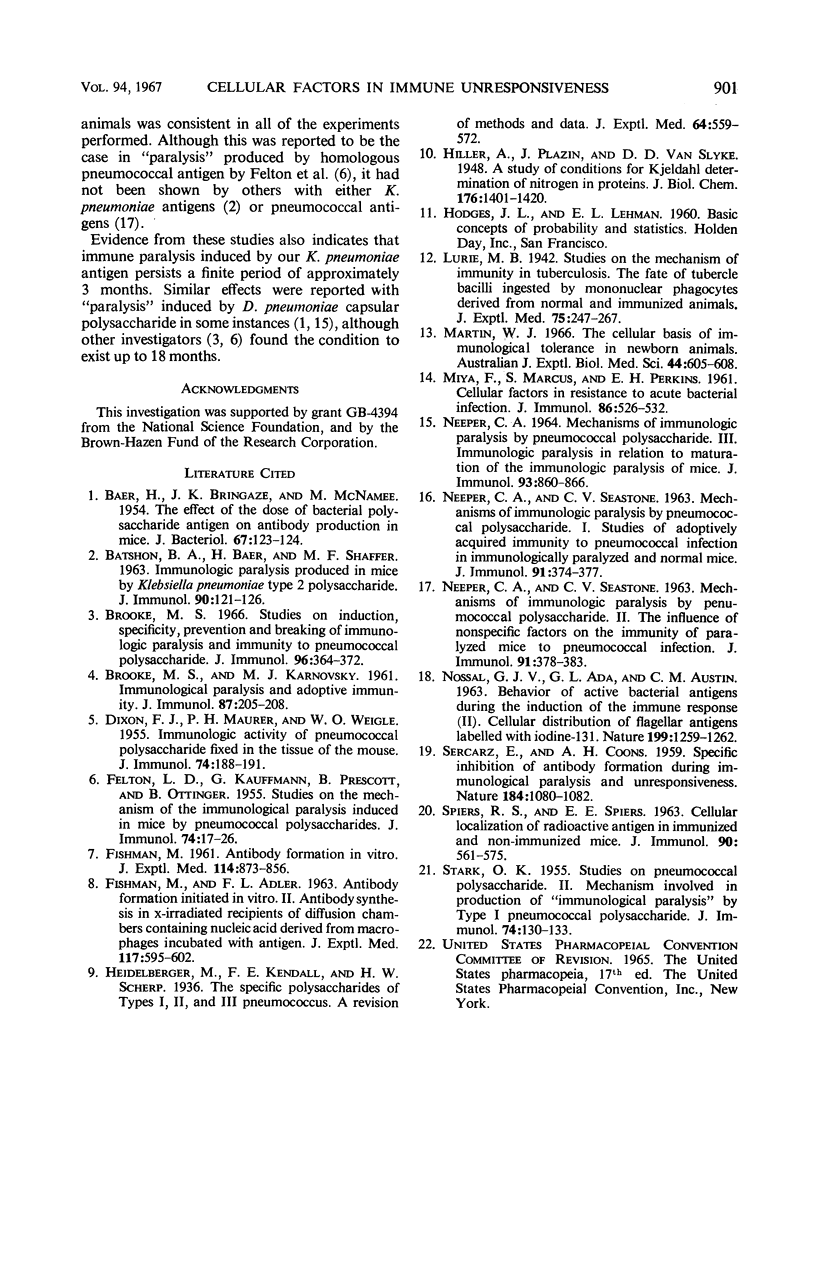Abstract
The mechanisms by which immune unresponsiveness (immune paralysis) develops are still uncertain. The present work was based on the assumption that this condition may be due to failure of certain activities of the macrophages. Data from passive transfer of such cells are interpreted as supporting this hypothesis. Purified capsular polysaccharide from type 2 Klebsiella pneumoniae induced immunity when given to Swiss albino mice in 5-μg amounts and immune paralysis when given in 1,000-μg amounts. The unresponsive state lapsed to that of acquired immunity 3 months after induction. Passive transfer of cells from groups of K. pneumoniae immune, “paralyzed,” and control mice showed that peritoneal cells from “paralyzed” donors induced significant protection against challenge in both control and “paralyzed” recipients. In contrast, spleen cells from control, “paralyzed,” and immune animals failed to effect such transfer. The finding that unresponsiveness could be terminated by peritoneal cells and not spleen cells indicates that macrophages played a primary role in immune paralysis, possibly owing to their loss of capacity to transfer factors or information for induction of antibody synthesis.
Full text
PDF





Selected References
These references are in PubMed. This may not be the complete list of references from this article.
- BAER H., BRINGAZE J. K., McNAMEE M. The effect of the dose of bacterial polysaccharide antigen on antibody production in mice. J Bacteriol. 1954 Jan;67(1):123–124. doi: 10.1128/jb.67.1.123-124.1954. [DOI] [PMC free article] [PubMed] [Google Scholar]
- BATSHON B. A., BAER H., SHAFFER M. F. Immunologic paralysis produced in mice by Klebsiella pneumoniae type 2 polysaccharide. J Immunol. 1963 Jan;90:121–126. [PubMed] [Google Scholar]
- Brooke M. S. Studies on the induction, specificity, prevention and breaking of immunologic paralysis and immunity to pneumococcal polysaccharide. J Immunol. 1966 Feb;96(2):364–372. [PubMed] [Google Scholar]
- DIXON F. J., MAURER P. H., WEIGLE W. O. Immunologic activity of pneumococcal polysaccharide fixed in the tissues of the mouse. J Immunol. 1955 Mar;74(3):188–191. [PubMed] [Google Scholar]
- FELTON L. D., KAUFFMANN G., PRESCOTT B., OTTINGER B. Studies on the mechanism of the immunological paralysis induced in mice by pneumococcal polysaccharides. J Immunol. 1955 Jan;74(1):17–26. [PubMed] [Google Scholar]
- FISHMAN M., ADLER F. L. Antibody formation initiated in vitro. II. Antibody synthesis in x-irradiated recipients of diffusion chambers containing nucleic acid derived from macrophages incubated with antigen. J Exp Med. 1963 Apr 1;117:595–602. doi: 10.1084/jem.117.4.595. [DOI] [PMC free article] [PubMed] [Google Scholar]
- FISHMAN M. Antibody formation in vitro. J Exp Med. 1961 Dec 1;114:837–856. doi: 10.1084/jem.114.6.837. [DOI] [PMC free article] [PubMed] [Google Scholar]
- MIYA F., MARCUS S., PERKINS E. H. Cellular factors in resistance to acute bacterial infection. J Immunol. 1961 May;86:526–532. [PubMed] [Google Scholar]
- Martin W. J. The cellular basis of immunological tolerance in newborn animals. Aust J Exp Biol Med Sci. 1966 Oct;44(5):605–608. doi: 10.1038/icb.1966.59. [DOI] [PubMed] [Google Scholar]
- NEEPER C. A. MECHANISMS OF IMMUNOLOGIC PARALYSIS BY PNEUMOCOCCAL POLYSACCHARIDE. 3. IMMUNOLOGIC PARALYSIS IN RELATION TO MATURATION OF THE IMMUNOLOGIC RESPONSE OF MICE. J Immunol. 1964 Nov;93:860–866. [PubMed] [Google Scholar]
- NEEPER C. A., SEASTONE C. V. MECHANISMS OF IMMUNOLOGIC PARALYSIS BY PNEUMOCOCCAL POLYSACCHARIDE. I. STUDIES OF ADOPTIVELY ACQUIRED IMMUNITY TO PNEUMOCOCCAL INFECTION IN IMMUNOLOGICALLY PARALYZED AND NORMAL MICE. J Immunol. 1963 Sep;91:374–377. [PubMed] [Google Scholar]
- NEEPER C. A., SEASTONE C. V. MECHANISMS OF IMMUNOLOGIC PARALYSIS BY PNEUMOCOCCAL POLYSACCHARIDE. II. THE INFLUENCE OF NONSPECIFIC FACTORS ON THE IMMUNITY OF PARALYZED MICE TO PNEUMOCOCCAL INFECTION. J Immunol. 1963 Sep;91:378–383. [PubMed] [Google Scholar]
- NOSSAL G. J., ADA G. L., AUSTIN C. M. BEHAVIOUR OF ACTIVE BACTERIAL ANTIGENS DURING THE INDUCTION OF THE IMMUNE RESPONSE. II. CELLULAR DISTRIBUTION OF FLAGELLAR ANTIGENS LABELLED WITH IODINE-131. Nature. 1963 Sep 28;199:1259–1262. doi: 10.1038/1991259a0. [DOI] [PubMed] [Google Scholar]
- SERCARZ E., COONS A. H. Specific inhibition of antibody formation during immunological paralysis and unresponsiveness. Nature. 1959 Oct 3;184(Suppl 14):1080–1082. doi: 10.1038/1841080a0. [DOI] [PubMed] [Google Scholar]
- SPEIRS R. S., SPEIRS E. E. CELLULAR LOCALIZATION OF RADIOACTIVE ANTIGEN IN IMMUNIZED AND NONIMMUNIZED MICE. J Immunol. 1963 Apr;90:561–575. [PubMed] [Google Scholar]
- STARK O. K. Studies on pneumococcal polysaccharide. II. Mechanism involved in production of immunological paralysis by type I pneumococcal polysaccharide. J Immunol. 1955 Feb;74(2):130–133. [PubMed] [Google Scholar]


